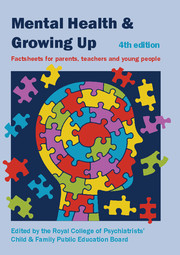Book contents
- Frontmatter
- Contents
- Contributors
- Factsheets for young people
- Factsheets for parents, carers and anyone who works with young people
- 1 Good parenting
- 2 The restless and excitable child
- 3 Dealing with tantrums
- 4 Children who soil or wet themselves
- 5 Sleep problems in childhood and adolescence
- 6 Behavioural problems and conduct disorder
- 7 Attention-deficit hyperactivity disorder (ADHD)
- 8 The child with general learning disability
- 9 Specific learning difficulties
- 10 Autism and Asperger syndrome
- 11 Depression in children
- 12 Worries and anxieties: helping children to cope
- 13 Divorce or separation of parents: the impact on children and adolescents
- 14 Death in the family: helping children to cope
- 15 The emotional cost of bullying
- 16 Traumatic stress in children
- 17 Domestic violence: its effects on children
- 18 Child abuse and neglect: the emotional effect
- 19 Drugs and alcohol: what parents need to know
- 20 Self-harm in young people
- 21 Psychosis
- 22 Schizophrenia
- 23 Bipolar disorder in children and adolescents
- 24 Obsessive–compulsive disorder in children and young people
- 25 Eating disorders in young people
- 26 Chronic physical illness: the effects on mental health
- 27 Medically unexplained physical symptoms
- 28 Chronic fatigue syndrome: helping your child get better
- 29 Parental mental illness: the problems for children
- 30 Who's who in CAMHS
28 - Chronic fatigue syndrome: helping your child get better
from Factsheets for parents, carers and anyone who works with young people
Published online by Cambridge University Press: 02 January 2018
- Frontmatter
- Contents
- Contributors
- Factsheets for young people
- Factsheets for parents, carers and anyone who works with young people
- 1 Good parenting
- 2 The restless and excitable child
- 3 Dealing with tantrums
- 4 Children who soil or wet themselves
- 5 Sleep problems in childhood and adolescence
- 6 Behavioural problems and conduct disorder
- 7 Attention-deficit hyperactivity disorder (ADHD)
- 8 The child with general learning disability
- 9 Specific learning difficulties
- 10 Autism and Asperger syndrome
- 11 Depression in children
- 12 Worries and anxieties: helping children to cope
- 13 Divorce or separation of parents: the impact on children and adolescents
- 14 Death in the family: helping children to cope
- 15 The emotional cost of bullying
- 16 Traumatic stress in children
- 17 Domestic violence: its effects on children
- 18 Child abuse and neglect: the emotional effect
- 19 Drugs and alcohol: what parents need to know
- 20 Self-harm in young people
- 21 Psychosis
- 22 Schizophrenia
- 23 Bipolar disorder in children and adolescents
- 24 Obsessive–compulsive disorder in children and young people
- 25 Eating disorders in young people
- 26 Chronic physical illness: the effects on mental health
- 27 Medically unexplained physical symptoms
- 28 Chronic fatigue syndrome: helping your child get better
- 29 Parental mental illness: the problems for children
- 30 Who's who in CAMHS
Summary
What are the symptoms?
The main symptom is extreme tiredness (fatigue) after little effort, which is not improved by rest, and not explained by physical or psychiatric illness. Chronic fatigue syndrome commonly starts with a short or sudden illness such as ‘flu’ or glandular fever, but it can also start gradually. It is a severely disabling condition that can often last a long time or comes and goes.
Common symptoms include:
• headaches
• aching muscles and other bodily pains
• disruption of your child's usual sleeping and eating patterns.
Like other severe physical illnesses, chronic fatigue syndrome has some important emotional and psychological effects. The child may become depressed, irritable and anxious, and find it difficult to concentrate or remember things.
Chronic fatigue syndrome can be a difficult diagnosis to make. Children often receive repeated specialist medical investigations.
What are the effects of chronic fatigue syndrome?
The disorder can seriously disrupt normal life. Your child may be unable to:
• carry out their usual activities, including attending school
• go out and see friends
• carry on with their hobbies.
School can be very difficult to cope with. Young people with chronic fatigue syndrome may quickly become very unfit from staying in bed, or just doing not very much for a long time. This causes rapid muscle loss, even in healthy people. All these complications make recovery more difficult.
Everyone in the family can feel the strain. Sometimes a parent may have to give up work to nurse their sick child. Brothers and sisters may feel that they are being neglected. Parents may disagree about whether the child is really sick, or is just ‘attention-seeking’.
How can I get help?
In the early stages of the illness, it may seem that no one knows what the problem is and how to solve it. This can upset the child, who may feel that no one believes that they are ill or understands them. Relationships can become strained at home and at school.
Your GP or school doctor will be able to refer your child to a paediatrician or child psychiatrist working in your local child and adolescent mental health service (CAMHS) for assessment and treatment. The school, especially the school nurse and psychologist, may need to support your child with problems at school.
- Type
- Chapter
- Information
- Mental Health and Growing UpFactsheets for Parents, Teachers and Young People, pp. 131 - 133Publisher: Royal College of PsychiatristsPrint publication year: 2013



